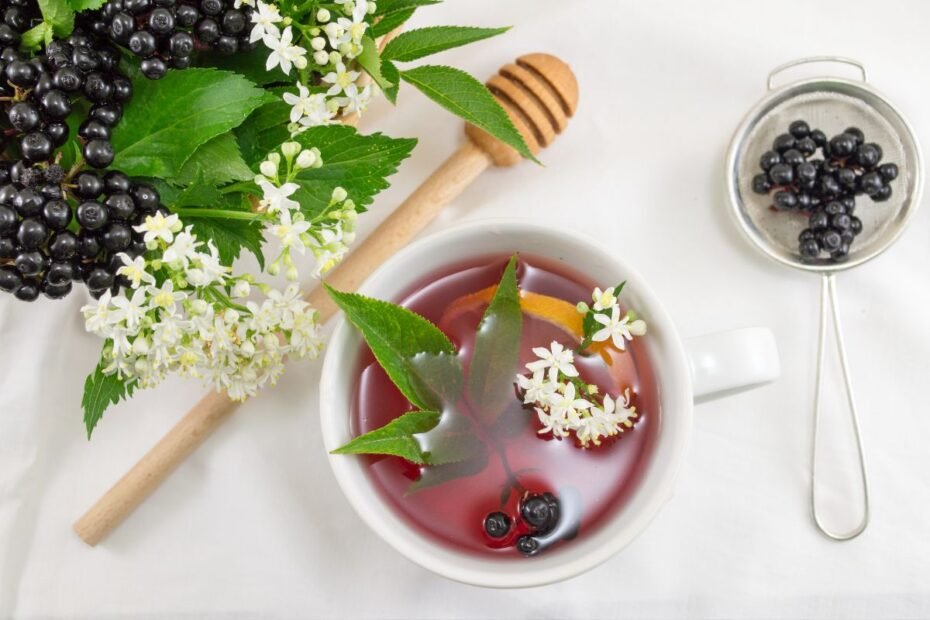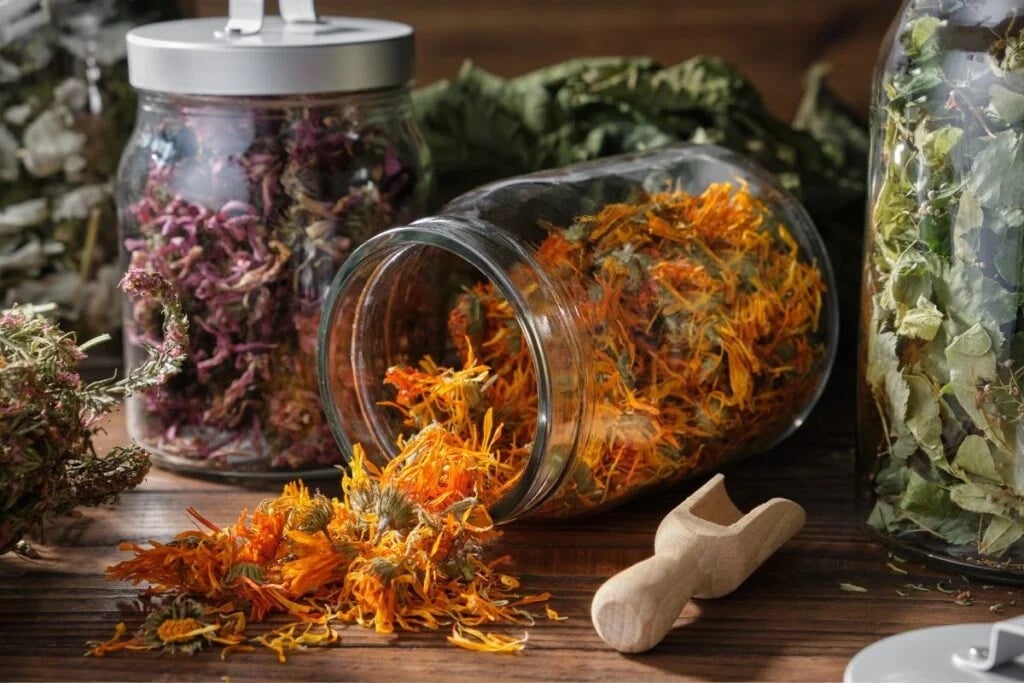Elderberry, elderflower, or just elder (Sambucus) belongs to the genus Sambucaceae. It is a deciduous, often unpleasant-smelling shrub or low tree whose flowers and berries are used to make elderberry tea. The plant is widespread in Europe, Asia, Africa, and North and South America. The leaves are compound, unpaired, and feathery. The flowers are clustered in panicles or umbel-shaped inflorescences. The flowers are white or yellowish. Elderberries produce black or red berries. The plant is known for elderberry tea benefits.
Elderflower is classified as a medicinal plant. The most common species of elders are the black elder (Sambucus nigra), the Canada elderberry (Sambucus canadensis), Sambucus williamsii, Sambucus peruviana, Sambucus australis, red elderberry (Sambucus racemosa). Germany and Austria are the leading producers of elderberries in the world today.
History shows that since ancient Egyptian times, the black elder has treated many diseases in various medicinal formulas as well as in cooking. The inhabitants of the Mediterranean coast and surrounding regions used various parts of the plant for many years, even the American Indians. There is evidence that, as early as the 5th century BC, Hippocrates, Dioscorides, and Pliny described the use of medicines prepared from the black elder tree.
Elderberry Benefits Based on Research
Scientific studies have shown that black elder, particularly the berries, contain biologically active compounds with antiviral properties.
Approximately 300 clinical trials have been conducted in China to control COVID-19 since March 2020. Therefore, around 50 have been with traditional Chinese remedies, and 14 have combined with Western medicine. Analyses of the clinical trials have shown that certain herbal extracts of black elderberry, African pelargonium, or wheatgrass effectively treat respiratory diseases. Laboratory studies demonstrated the antiviral activity of elderberry and African pelargonium polyphenols against human coronaviruses.
Medicines use the elderberries’ bark, leaves, flowers, fruit, and roots for drug production. Black elder is not considered poisonous. Isolated cases of poisoning of animals and humans have been reported after ingesting bark, leaves, berries, roots, and stems. Research has shown that all parts of the plant contain sambunirin and the poisonous cyanogenic glycoside, except the flowers and ripe fruits. Nowadays, medicinal preparations and teas use the flowers and ripe berries of the black elder to enhance elderberry tea benefits.
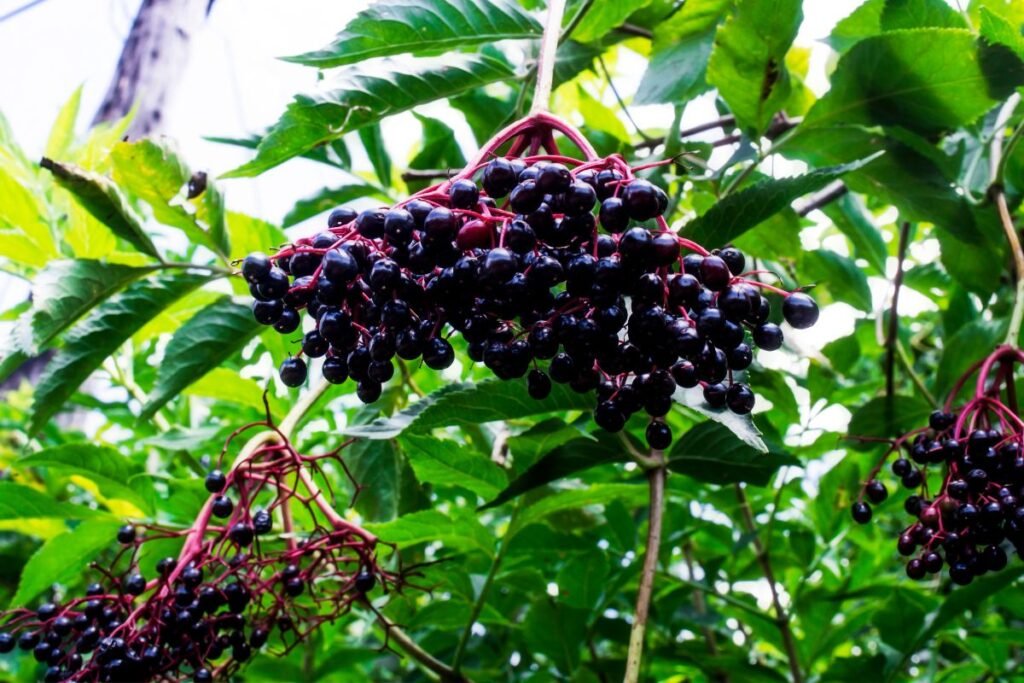
Elderflower Tea Benefits
Following extensive research, it confirmed that the flowers and fruit of the elderberry are a natural source of bioactive compounds with potent antioxidant properties. People use it for therapeutic purposes as well as for the prevention of many diseases.
- Respiratory infections
- Headaches
- Atherosclerosis
- Diabetes
- Arthritis
- Cancer
In addition to flavonoids, the phenolic acids in elderberries contain peptic polysaccharides, which play an essential role in the human immune system.
Folk medicine knows that elder flowers often serve as a first remedy for colds and flu. It is also a useful tea for various inflammatory conditions, as it is urine-diluting and disinfecting.
Harvesting Flowers and Berries of Elders
Harvest the elderflowers at the end of May and in June. Flowers that have not yet bloomed and those that are sunburnt and reddened should not be harvested. It is also important not to pick all the flowers from a single bush, as the elderberry ripens its excellent berries in autumn. Spread the collected elder blossoms on a tablecloth to keep bugs away. It is recommended not to wash the flowers. Like all herbs, dry it in a shaded and ventilated room protected from direct sunlight. Store dried elderflowers in cloth bags for up to one year. Elder flowers and preparations ready for use are available in pharmacies.
Elderberries ripen between August and September. Wilt and dry the berries at 60–65 °C.
You can easily find the elder trees in old farmsteads, moist mixed deciduous forests, and along riverbanks. Remember, do not collect elder materials growing near the roads, busy streets, and urban areas.
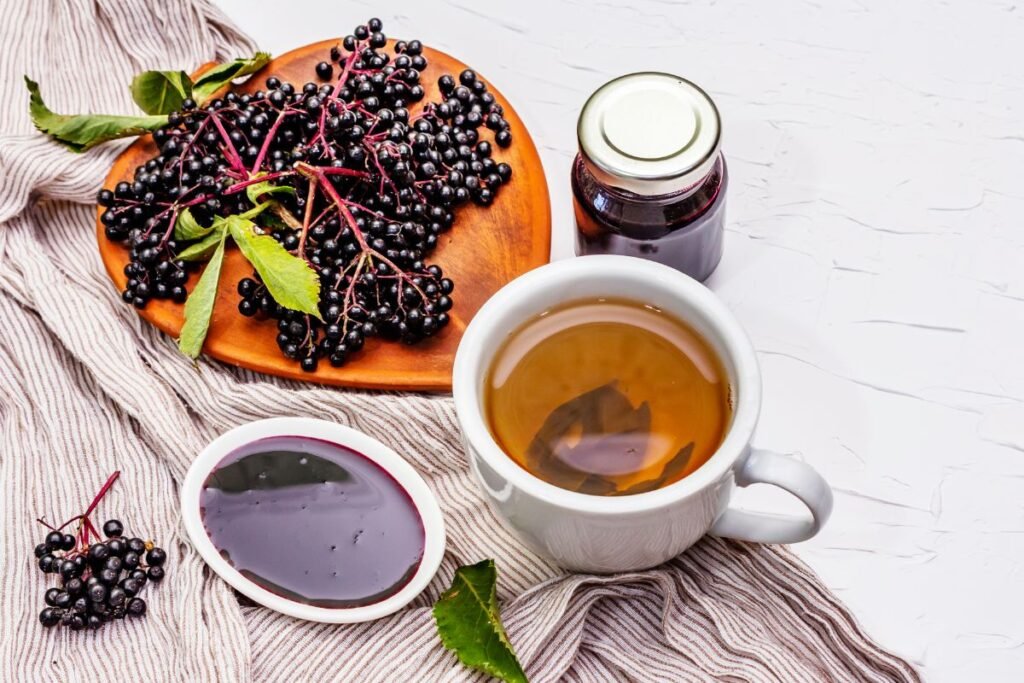
Elderberry Tea Benefits: Recipe with Rosemary and Apples
This elderberry tea is not only delicious but also healthy. It can help with back pain and neuralgia. You can drink it both warm and chilled.
You will need:
- 100 g elderberries
- 100 g apples
- 2 sprigs of rosemary
- 1 tbsp. of thyme.
Slice the apple into thin slices and place it in a heatproof bowl with the other ingredients. If you wish, you can peel the skin off the apple. Pour boiling water over everything; cover with a lid and a towel. Leave to infuse for 15–30 minutes, and enjoy a fragrant and tasty drink.
Elderberry Tea from Berries
For 1 liter of elderberry tea, you will need:
- a teapot or other heat-resistant container;
- 4 teaspoons of dried elderberries;
- 1 liter of water;
- sugar or other sweetener of your choice;
- 1/2 orange or lemon (optional).
Bring the water to a boil, after that let it cool slightly. In the meantime, put the elderflowers in a teapot. Pour hot, boiled water over them. Wash the orange or lemon well and cut it into slices. Place the slices in the teapot and leave for 10 minutes. You can then strain (although it is not necessary) and drink.
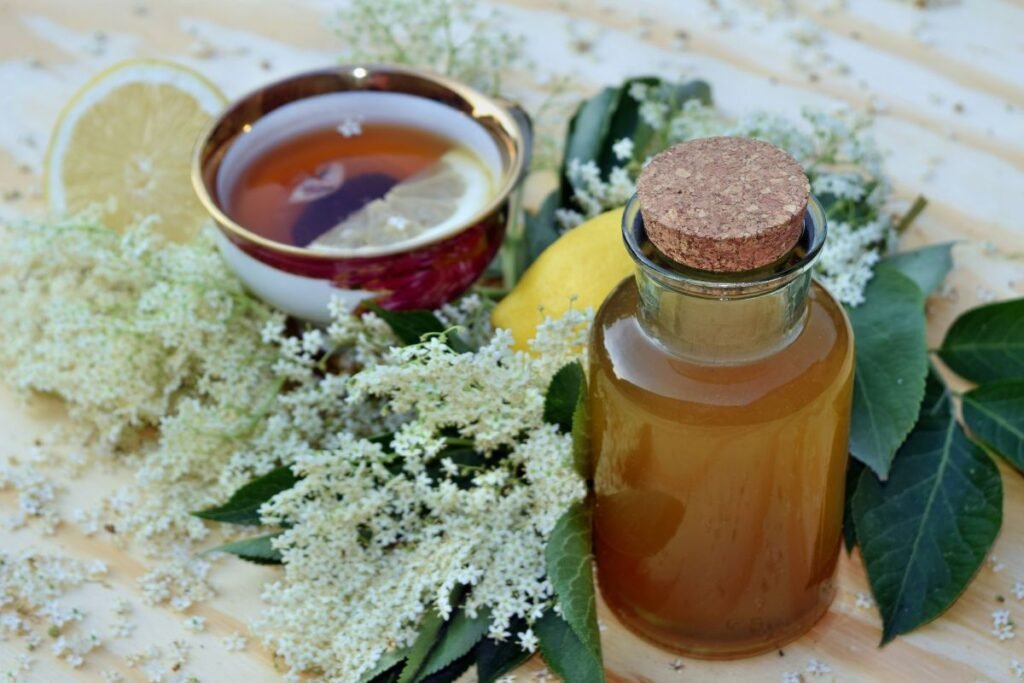
Elderflower Syrup
This elderflower syrup is perfect for boosting the immune system.
You will need:
- sterilized bottles or other glass containers for storing the syrup;
- 3 tablespoons of elderflowers;
- three liters of water;
- 3 kg of sugar;
- 2 tablespoons of lemon juice.
Cover the collected elderflowers with water and leave them overnight. The next day, drain well and add the sugar to the liquid. Bring the resulting syrup to a boil and remove it from the heat. When the syrup has cooled slightly, add the lemon juice. Pour the syrup into sterilized containers while it is still hot.
Elderflower Tea Benefits and Recipe
Elderflowers are used to make an anti-inflammatory tea for kidney disease, inflammation of the intestines, pancreatic and biliary diseases, and respiratory diseases.
You will need:
- A cup for preparing the tea;
- 1 tablespoon of black elder flowers;
- 500 ml of boiling water.
Cover the elderflowers with boiling water and steep them for 5–10 minutes. You can strain the tea before drinking it. Drink this tea 20 minutes before meals.
Mix elderflowers in equal parts with linden blossoms to enhance the power of elderflowers. It is also possible to add some medicinal thyme and sage.

Possible Side Effects of Elderberry Tea
Scientific studies have proved the immunological side effects of elderberry. Elderflower pollen can cause an allergic reaction characterized by rhinitis and shortness of breath in people allergic to grass pollen.
Fresh black elderberry fruit has been shown to cause adverse neurological effects such as weakness, dizziness, and numbness of the limbs.
The consumption of elderberries is not recommended.
- pregnant and nursing women;
- children under 2 years of age.
Important! Keep in mind that poisonous cyanidin glycosides accumulate in all parts of elder trees. In addition, excessive consumption of elder flowers can cause nausea and diarrhea.
Consult your doctor before taking elderberry preparations!
Sources:
https://www.webmd.com/diet/elderberry-tea-is-it-good-for-you
https://www.healthline.com/nutrition/elderberry
https://www.health.com/health-benefits-of-elderberry-7506026
Associative photos from © Canva.
